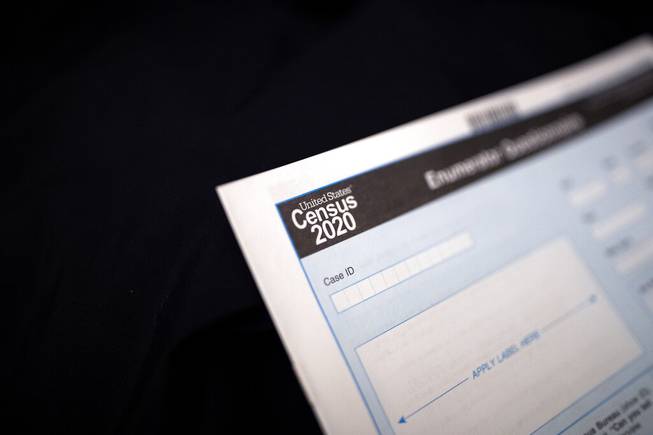
Gregory Bull / AP
A Census 2020 form is seen Tuesday, Jan. 21, 2020, in Toksook Bay, Alaska.
Friday, March 27, 2020 | 2 a.m.
View more of the Sun's opinion section
The 2020 U.S. Census is in full swing, with households having received instructions by mail on how to respond to the census online, by phone or by mail.
But unfortunately, myths and scams related to the census are cropping up like spring weeds, threatening to deter people from participating in the count. And that’s not good for Nevada, because an undercount could hurt our state in a number of very real ways, including by leaving us shortchanged on federal funding for Medicare and Medicaid assistance, school lunches, transportation projects and much more.
More on that in a moment, but first let’s tackle some of the misinformation and chicanery surrounding the census.
• Contrary to a scam reported this week, participation in the census is not a requirement for families or individuals to receive checks from the federal government’s $2 trillion coronavirus emergency relief funding package. Scammers have set up at least one fake census site attempting to dupe people into providing sensitive information in order to receive relief checks. As explained by Emily Persaud-Zamora, an advocate who is working to ensure traditionally undercounted Nevada residents participate in the census, there’s no tie between the emergency funding and the census, and the Census Bureau will not provide information to other arms of government. “Data and responses collected by the Census Bureau are confidential for 72 years and not shared with other government agencies, or anyone else,” she said in a statement.
• As reported earlier, scammers impersonating census takers are going door-to-door and requesting personal information that can be used for identity theft. Nevadans should know that legitimate census workers will not request Social Security numbers, citizenship status, credit card or bank information, and other sensitive info. In addition, census workers are required to carry photo ID badges issued by the U.S. Department of Commerce and containing a gold chip similar to those on credit cards.
• The census form does not include a citizenship question; federal courts blocked the Trump administration from adding one. The census merely counts everyone living in a home, regardless of citizenship status, and the law prevents the Census Bureau from sharing any information with law enforcement or anyone else. The bureau is required to use all the information it collects strictly for statistical purposes.
• Participants in the census will not be asked about their religion, political information or income.
• The census does not include questions about sexual orientation or gender identity, although for the first time it does allow respondents to choose from same-sex relationship options. LGBT advocates are countering false rumors that the Trump administration plans to toss out responses from individuals who choose those options, stressing that all LGBT individuals and households will be counted.
By knowing the facts and sharing accurate information with family members, friends and neighbors, Nevadans can ensure our state gets a full and complete count in the census. That’s vital, because census data is used to formulate the distribution of $675 billion in federal government spending and is used to determine how many U.S. House members each state is allotted. To ensure our state is adequately represented in Washington, D.C., and obtains its fair share of funding for social services and infrastructure, it’s critical for all of us to participate.
To help Nevadans sift out fact from fiction, accurate information is available from the Census Bureau at tinyurl.com/ census-rumors.
Meanwhile, those ready to respond can do so in the following ways:
• Online by visiting tinyurl.com/census-respond
• By phone at 844-330-2020 (English), 844-468-2020 (Spanish), 844-478-2020 (Tagalog), and 844-467-2020 (American Sign Language support via a Telephone Display Device).
The census asks one person per household to report how many people are living and sleeping most of the time in their home on Census Day, which occurs next Wednesday. Households that don’t respond will be sent a follow-up questionnaire by mail, followed by an in-person visit from a Census Bureau worker in May or June.
Let’s spread the word, Nevada. By sharing accurate information, we can counter the myths and beat back the scammers so our state is fully counted.
